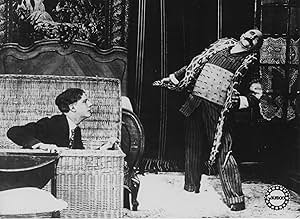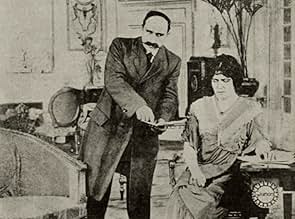Fantômas - À l'ombre de la guillotine
Original title: Fantômas I: À l'ombre de la guillotine
IMDb RATING
6.9/10
2.7K
YOUR RATING
Inspector Juve is tasked to capture the infamous criminal genius Fantômas who, ruthless and particularly elusive, changes his appearance and holds Paris' high society in a crippling grasp.Inspector Juve is tasked to capture the infamous criminal genius Fantômas who, ruthless and particularly elusive, changes his appearance and holds Paris' high society in a crippling grasp.Inspector Juve is tasked to capture the infamous criminal genius Fantômas who, ruthless and particularly elusive, changes his appearance and holds Paris' high society in a crippling grasp.
- Awards
- 1 nomination total
Edmund Breon
- Inspector Juve
- (as Edmond Bréon)
André Volbert
- L'acteur Valgrand
- (as Volbert)
Featured reviews
A multiple-reel drama in which there are good situations and well handled. M. Navarre plays a dual role and does splendid work. Opposite him is the Gaumont's famous leading woman, Mme. Renee Carl; she justifies every expectation. The story is of a bold thief, of the gentleman sort, who commits a robbery. He has also committed a murder. After his arrest and conviction, the wife of the murdered man, in love with the thief, bribes the keepers of the latter to bring him to her home, a short distance from the prison. It is the night preceding his execution. The same evening, a famous actor gives a representation of the condemned man in his cell. The impersonator is decoyed to the house of the woman after the murderer has arrived. He is still in his convincing make-up. After the woman has drugged him, the jailers take him back to his cell. As he is being prepared for the execution, a detective discovers that the man still under the influence of the drug is not the murderer. The final curtain is to the effect that "Henceforth it is Juve (the detective) versus Fantomas." So we may expect a continuance of the story at a later time. The picture will interest. - The Moving Picture World, June 28, 1913
Everything perfect in Louis Feuillade's FANTOMAS series.Action is very expressive and leave behind any possible dialog.Gestures of actors are accurate and laconic.Text between grounds styled in form of visiting cards or newspaper articles.Much significance have the space outside of frame.Stairs,curtains,lifts,windows and walls are produced the intricate labyrinth where every becomes victim or criminal.Poor decorations work as guide in this tangled area.This active space of film no need special effects or even camera travelings.As result we have pure cinematic product which speak with audience by language of images.Leterature and theater resources are slaves of this cinema triumph.
For those of you not familiar with Louis Feuillade, he was the artistic director of France's Gaumont Studios from 1907-1918 during which time he directed or supervised over 800 films. He is best remembered today for his groundbreaking crime serials FANTOMAS, JUDEX, and LES VAMPIRES which still have the power to amaze and entertain almost 100 years later. FANTOMAS is the earliest of the three dating from 1913-14. It is the blueprint for countless crime serials that would follow where an archcriminal who is a master of disguise and head of a vast criminal empire (Fantomas) is doggedly pursued by a dedicated "supercop" (Inspector Juve) and his sidekick (Fandor) who are determined to bring him down.
FANTOMAS was conceived on a grand scale. It breaks down into five films (IN THE SHADOW OF THE GUILLOTINE, JUVE-vs-FANTOMAS, THE MURDEROUS CORPSE, FANTOMAS-vs-FANTOMAS, THE FALSE MAGISTRATE) and runs for over 5 1/2 hours. It is full of disguises, surprises, several comic moments, a touch of the supernatural and surprising brutality. It's also a time capsule of settings and life before World War One which makes it invaluable as history. Rene Navarre and Edmond Breon as protagonist and antagonist give surprisingly restrained (and effective) performances considering that this film was made in 1913. Be warned, once you start it, it's hard to stop watching, even if you're not into silent films.
Although it was the first to be made, FANTOMAS is the last of three great Feuillade serials to make it to Region One DVD. LES VAMPIRES and JUDEX have been available for a few years now and if you haven't seen them you should check them out as well. Gaumont did the restoration back in 1998 and the film looks astonishing for its age. It was first released on Region 2 DVD in the U. K. by Artificial Eye back in 2006. This edition comes with an entertaining and appropriate music score as well as special features that include 2 short Feuillade films as well as commentary from film historian David Kalat. Thanks to Kino for finally making it available in the USA so that Americans can it enjoy it as well...For more reviews visit The Capsule Critic.
FANTOMAS was conceived on a grand scale. It breaks down into five films (IN THE SHADOW OF THE GUILLOTINE, JUVE-vs-FANTOMAS, THE MURDEROUS CORPSE, FANTOMAS-vs-FANTOMAS, THE FALSE MAGISTRATE) and runs for over 5 1/2 hours. It is full of disguises, surprises, several comic moments, a touch of the supernatural and surprising brutality. It's also a time capsule of settings and life before World War One which makes it invaluable as history. Rene Navarre and Edmond Breon as protagonist and antagonist give surprisingly restrained (and effective) performances considering that this film was made in 1913. Be warned, once you start it, it's hard to stop watching, even if you're not into silent films.
Although it was the first to be made, FANTOMAS is the last of three great Feuillade serials to make it to Region One DVD. LES VAMPIRES and JUDEX have been available for a few years now and if you haven't seen them you should check them out as well. Gaumont did the restoration back in 1998 and the film looks astonishing for its age. It was first released on Region 2 DVD in the U. K. by Artificial Eye back in 2006. This edition comes with an entertaining and appropriate music score as well as special features that include 2 short Feuillade films as well as commentary from film historian David Kalat. Thanks to Kino for finally making it available in the USA so that Americans can it enjoy it as well...For more reviews visit The Capsule Critic.
Fantomas is a kind of French Moriarty, an arch-criminal, leader of a huge rag-tag band of villains, who can evade arrest by two policemen holding each of his arms simply by shaking his wrists and knocking them both out. I ask you, what chance has an honest copper got? The film actually seems quite ambivalent about him at times, and you suspect there is a sneaking admiration for him on the filmmakers' part, despite his incredibly ruthless streak (in one episode he uncouples a train carriage and sends its passengers to their death so that they can't act as witnesses against a robbery he has committed on board; in another incredible sequence he leaves a fellow villain stranded inside a church bell to await certain death the next time it is rung).
The story lines of this French pre-WWI serial are fairly simplistic and don't stand up to even cursory scrutiny but, as a time capsule from a bygone age, the films are fascinating. Louis Feuillade's style of direction is basic to say the least and, for such a renowned early name from French cinema, something of a disappointment. The camera never moves, and every shot appears purely functional and nothing more. Perhaps I'm missing something, or perhaps I'm expecting more than I should from a piece of work nearly one hundred years old, but his style makes things drag at times. The film only really comes alive when Feuillade takes his camera outside to capture scenes of both rural and urban France. The film makes as much use of letters as it does intertitles to drive the story on and, considering the hindrance of it being a silent film, it's a device that works quite well.
Fantomas will only be of interest to the movie buff rather than the film fan. The art of storytelling has moved on or, given the impression of advancement that gives, perhaps changed is a better word and even the most patient of filmgoers will find that the pace drags at times. Nevertheless, given its place in film history, it's an important film that is worth checking out.
And it's also worth watching just for the final get-out-of jail card played by the wily Fantomas
The story lines of this French pre-WWI serial are fairly simplistic and don't stand up to even cursory scrutiny but, as a time capsule from a bygone age, the films are fascinating. Louis Feuillade's style of direction is basic to say the least and, for such a renowned early name from French cinema, something of a disappointment. The camera never moves, and every shot appears purely functional and nothing more. Perhaps I'm missing something, or perhaps I'm expecting more than I should from a piece of work nearly one hundred years old, but his style makes things drag at times. The film only really comes alive when Feuillade takes his camera outside to capture scenes of both rural and urban France. The film makes as much use of letters as it does intertitles to drive the story on and, considering the hindrance of it being a silent film, it's a device that works quite well.
Fantomas will only be of interest to the movie buff rather than the film fan. The art of storytelling has moved on or, given the impression of advancement that gives, perhaps changed is a better word and even the most patient of filmgoers will find that the pace drags at times. Nevertheless, given its place in film history, it's an important film that is worth checking out.
And it's also worth watching just for the final get-out-of jail card played by the wily Fantomas
The story of Fantomas's exploits and adventures are also those of the woman he loves and the men trying to catch him. In a time when films still used novelty to draw crowds these shorts entertained audiences with exhilarating escapes, astounding disguises, and taboo violence. Fantomas is a series of five short films produced in the golden age of silent film in France, 1913 to 1914. Each episode continues the story of the criminal Fantomas has he evades Inspector Juve time and time again. These films were directed by Louis Feuillade and produced by the Gaumont studios. Critics and fans worldwide have enjoyed these films and the mystery/detective novels they were based on.
Did you know
- ConnectionsFeatured in Fantômas 70 (2001)
- How long is Fantômas: In the Shadow of the Guillotine?Powered by Alexa
Details
- Release date
- Country of origin
- Official site
- Languages
- Also known as
- Fantômas
- Filming locations
- 3 Rue Huraut, Villemomble, Seine-Saint-Denis, France(Beltham's house)
- Production companies
- See more company credits at IMDbPro
- Runtime
- 54m
- Color
- Sound mix
- Aspect ratio
- 1.33 : 1
Contribute to this page
Suggest an edit or add missing content





























